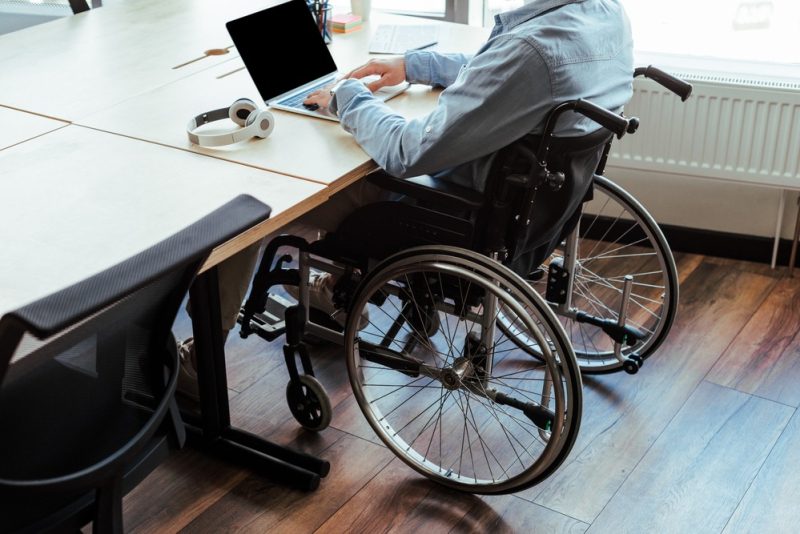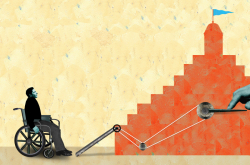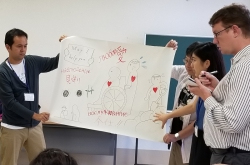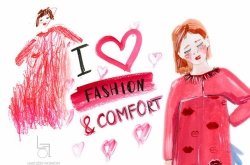In the context of education, the term “social integration” was first used in the mid-20th-century USA and originally referred to the enrollment of students of different races in the same class; only later did it start referring to people with disabilities. “Integration” came to embody its modern meaning in the second half of the 20th century with the emergence of the normalization concept in Scandinavia.
Integration and inclusion are each based on the concept of normalization – the idea that the lifestyle of people with disabilities must be as similar as possible to the lifestyle of the society in which they live. The principles of normalization are described in the Declaration of the Rights of the Child and the Declaration on the Rights of Disabled Persons.
According to Natalia Rud, a professor and a specialist in inclusive education at Moscow City University, inclusive education is the process of developing an education system that entails the availability of education to all in terms of adaptation to various needs of children with disabilities.
The major issues of social integration in the Russian education system were always the rational organization of general and specialized education systems and the development of an inclusive educational space. Things are improving, in part, thanks to the major developments on a worldwide political level in regards to inclusive education and rights of people with disabilities. In 2012, the Russian government ratified the UN convention on the rights of people with disabilities, which was devised all the way back in 2006 and was signed by Russia in 2008. From 2012 and onward, several legislation acts have been passed in regards to the establishment of inclusive education in Russia.
As a direct result of the development of pedagogy and inclusive education in our country, and of the actions of the Russian government, the number of people with disabilities who strive to become students in Russian universities has been steadily climbing, with a drop in 2014 due to the Russian financial crisis. As of 2021, the total number of students with disabilities in Russian universities is higher than it was prior to the crisis. According to Rosstat (link in Russian), the total number jumped from 16,000 in 2014 to 24,000 in 2019 and is estimated to be about 28,000 in 2021.
It is clear that the developments are positive. The new laws are proving themselves effective, statistically speaking. However, inclusion is as much a political issue as it is a social one. In a university setting, inclusivity implies a collective effort of students with disabilities to integrate themselves into the learning process and of the teaching staff and other students to assist them in that. To guarantee true inclusion, you have to start from the concept.
Due to inclusivity being a novel concept for a majority of Russians, ignorance, prejudice, and assumptions hinder inclusion greatly. Societal development in this regard is historically divided into four stages: exclusion, segregation, integration, and inclusion. These stages must follow each other in this exact order – or society will not be ready to receive and accommodate a minority. Russia has effectively skipped the integration part due to external pressure to evolve; we push children with disabilities into classes with regular kids, held by teachers who have no idea how to accommodate and properly teach them. For a large part of the population, disabilities do not exist at all simply because of a lack of experience of interacting with those with disabilities. That is something that must be fixed in order for us to reach a nationwide understanding of disabilities and people living with them.
So, what about ITMO University in regards to inclusive education? The Center for Inclusive Education was founded at ITMO University in 2016, and as of 2021 has a staff of five, including a psychologist, an educational specialist, and an engineer who specializes in the purchase and maintenance of special equipment designed to assist people with specific types of disabilities.
At many similar centers, providing enough support is a challenge because it requires highly skilled professionals trained to work with people with disabilities. An employee of such a center must have a background in inclusive education, psychology, and rehabilitation in order to fully realize the potential that the term “inclusive education” implies. There are many courses and training centers in Russia that train such professionals, allowing teachers to enhance their qualifications.
All employees of ITMO’s Center of Inclusive Education who work directly with people with disabilities have the necessary education, so it is safe to assume that they are qualified individuals. The Center puts out a regular newsletter showcasing a variety of psychology-focused events hosted by this center, dedicated to the promotion and establishment of inclusive education in our university. In tandem with the Medical, Psychological and Social Assistance Center, they offer individual and group consultations, provide services of sign language interpreters, accept volunteers, and even have special optional courses available for Bachelor’s and Master’s students who want to further their understanding of inclusive education.
Psychological support is extremely important, but what about the physical aspect of it? To this end, the Center of Inclusive Education offers special sports equipment designed for people with disabilities. As for the various technical equipment physically present in ITMO campuses, there are Braille script tablets, special bathroom stalls, ramps, electronic devices adapted for people with disabilities, etc. Even sinks are designed to suit particular physical disabilities. ITMO also offers special accommodation to people with disabilities in its dormitories; in addition to this, ITMO offers special employment programs for graduates with disabilities and such benefits as monthly financial support, and most importantly, the ability to study tuition-free at ITMO on any program of choice upon presenting medical documents that confirm the presence of a disability, be it physical or mental.
The progress in building a culture of inclusiveness is ongoing but there’s still a long way to go. We have to keep trying – for the better of our people and our society in general.
Written by Anastasia Pivovarova
Digital Journalism student
Soft Skills 2021



